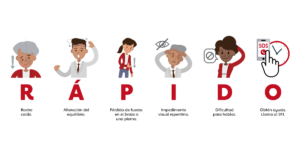
September 26, 2023 – Washington, DC. – In honor of Hispanic Heritage Month, HCN and the American Stroke Association (ASA), a division of the American Heart Association (AHA), collaborated to launch R.Á.P.I.D.O., the official acronym promoting awareness about stroke symptoms and warnings signs among Hispanic and Spanish-preferring communities. The national campaign aims to promote R.Á.P.I.D.O. as an easy way to remember and identify the signs of a stroke and to call for emergency medical services.
According to ASA, stroke is the #3 killer of Hispanic women and the #4 killer of Hispanic men in the U.S. Hispanic women and men are at a higher risk for having a stroke due to unmanaged risk factors, limited access to health care, lower health literacy rates, cultural barriers, and socioeconomic determinants of health. The campaign will provide information to Spanish-speaking consumer audiences about the importance of recognizing sudden stroke symptoms and responding quickly by calling 911 to help save lives.
The Spanish-language campaign, Juntos Contra el Derrame Cerebral, promotes the use of the R.Á.P.I.D.O. acronym to bridge the gap many Hispanic/Latino adults face by providing access to health literacy and education in plain language that is easier to understand and remember when encountering a stroke, which is a life-threatening medical event. R.Á.P.I.D.O. is the first acronym in Spanish to be endorsed by ASA and was developed by a group of stroke experts at the University of Texas Health
Science Center at Houston (UTHealth Houston), many of whom are ASA volunteers. R.Á.P.I.D.O. was designed to enable better understanding and response to stroke symptoms by teaching the six warning signs of a stroke and reinforcing the importance of calling 911 for a quick medical response.
The English acronym, F.A.S.T., stands for facial drooping, arm weakness, speech difficulty and time to call 911, according to the American Heart Association’s website.
The acronym in Spanish is outlined below (with English translations):
- R - Rostro caído (face drooping)
- Á - Alteración del equilibrio (loss of balance, or lack of coordination)
- P - Pérdida de fuerza en el brazo (loss of arm strength / arm weakness)
- I - Impedimento visual repentino (sudden vision difficulty)
- D - Dificultad para hablar (difficulty speaking, slurred or strange speech)
- O - Obtén ayuda, llama al 911 (get help, call 911)
“We are incredibly proud of the work our team has done in developing this important stroke awareness campaign for the American Stroke Association and the American Heart Association so our communities can know the signs and act quickly,” says Alison Rodden, CEO of HCN. “Our specialty at HCN is collaborating with mission-driven clients on developing public education campaigns that are catchy and easy-to-remember. We use “edu-tainment” approaches that promote awareness and access to information and are appropriate for the health literacy level of our consumer audiences. This approach has proven to have a lasting impact on improving the lives of Hispanics and multicultural communities that are often disproportionately impacted.”
The Spanish-language campaign created by HCN and ASA includes videos from stroke survivors (available on YouTube), public service announcements, social media and digital assets, a bilingual website, illustrations for the R.Á.P.I.D.O. acronym and a jingle intended to help people learn and remember the acronym in a catchy, easy to memorize combination of salsa and cumbia music.
“The goal of this campaign is to empower the Hispanic/Latino community to learn the stroke warning signs, understand them, and then, most importantly, what to do, which is to call 911,” says Natalia Ortiz, American Heart Association national senior marketing communications lead for cultural initiatives. “In a lot of communities, it’s not that simple to call 911. There’s a lot of mistrust and a lot of fear around calling 911.”
About the American Stroke Association
The American Stroke Association is devoted to saving people from stroke — the No. 2 cause of death in the world and a leading cause of serious disability. The American Heart Association teams with millions of volunteers to fund innovative research, fight for stronger public health policies, and provide lifesaving tools and information to prevent and treat stroke. The Dallas-based association officially launched in 1998 as a division of the American Heart Association. Connect with them on stroke.org, Facebook, X, or by calling 1-888-4STROKE.
About the American Heart Association
The American Heart Association is a relentless force for a world of longer, healthier lives. It is dedicated to ensuring equitable health in all communities. Through collaboration with numerous organizations and powered by millions of volunteers, it funds innovative research, advocates for the public’s health and shares lifesaving resources. The Dallas-based organization has been a leading source of health information for nearly a century. Connect with them on heart.org, Facebook, X, or by calling 1-800-AHA-USA1.
About HCN & La Red Hispana
HCN is a full-service, culture-first and data-driven social impact agency that delivers marketing, communications, PR, and advertising services via “in the air” multimedia, as well as “on-the-ground” solutions through our stakeholder and health worker networks, which involve capacity building, training and outreach. HCN also serves as the largest producer and syndicator of public interest content and programming for Spanish-language media in the US. HCN works exclusively with government, nonprofit, philanthropy and CSR clients that match their mission to improve quality of life for US Latino and Multicultural communities. Through its La Red Hispana multimedia networks and influencers personalities on radio, TV, digital, social media, print and mobile platforms, HCN currently reaches a measured audience of over 8 million Latinx consumers in urban, mid-sized and rural markets weekly. For more information visit hcnmedia.com and laredhispana.org